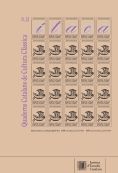Tragedia y lírica epinicial: a propósito de Eurípides, HF 673-700
Article Sidebar

Main Article Content
Esteban Calderón Dorda
We can see that the strophic pair points to the characteristics of epinician
in a fairly orthodox way. Heracles, in compiling all his exploits, is presented as Ἡρακλῆς ὁ καλλίνικος (HF 582). Moreover, the presence of Heracles in epinician poetry is frequent, because of the magnificent nature of his deeds, among other reasons. Ultimately, there is a Pindaric influence, which is mainly observed in a very precise and rich poetic-musical terminology, palpable in the choice of words, positioning of them and metric interweaving, as well as in the agonistic references, offering a perfect structural unit.
in a fairly orthodox way. Heracles, in compiling all his exploits, is presented as Ἡρακλῆς ὁ καλλίνικος (HF 582). Moreover, the presence of Heracles in epinician poetry is frequent, because of the magnificent nature of his deeds, among other reasons. Ultimately, there is a Pindaric influence, which is mainly observed in a very precise and rich poetic-musical terminology, palpable in the choice of words, positioning of them and metric interweaving, as well as in the agonistic references, offering a perfect structural unit.
Article Details
Com citar
Calderón Dorda, Esteban. «Tragedia y lírica epinicial: a propósito de Eurípides, <i>HF 673-700</i> ». Ítaca: quaderns catalans de cultura clàssica, 2017, núm. 33, p. 9-23, https://raco.cat/index.php/Itaca/article/view/335507.
Articles més llegits del mateix autor/a
- Esteban Calderón Dorda, Rito y sacrificio en Esquilo : aspectos léxicos , Ítaca: quaderns catalans de cultura clàssica: Núm. 19: 2003